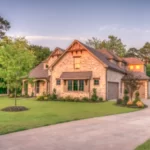You’ve heard real estate is a lucrative investment, but how do investors get rich doing it? Buying a home is expensive. Holding onto it and renting it out is a lot of work and certainly not going to get you rich overnight. So what’s the big secret to getting rich investing in real estate?
How To Make Money In Real Estate And Get Rich

It’s all about flipping houses. If you know what to look for and how to flip them, you can make a decent profit and potentially build wealth. There isn’t a cut and dry formula that you can cut and paste and ensure the riches, but with these steps, you’ll be on the right track.
1] Know The Area
Don’t invest in just any cheap home – it has to be a home in an area that you’ll make money from. For example, if all the homes are priced low, how will you make a profit? When you buy a property, to flip or not, you must know the area, who it serves, and the average sales price for houses not in a ‘fixer-upper’ state.
2] Research The Market
Buying a house to flip is great, but if there aren’t buyers, who do you sell to? Buying a fix and flip home works best in a seller’s market because there are fewer properties on the market and plenty of interested buyers. You have a better chance of getting a higher sales price than you would in a buyer’s market.
Want a quick way to tell if it’s a seller’s market? Find out how many homes are on the market in the area. Next, find out the average number of properties that sell each month in that specified area.
Divide the total homes by the number of monthly sales and you have the number of months of inventory available. If there are less than six months of homes on the market, you’re in a seller’s market and have a good chance of getting top dollar for the home.
3] Watch Out For Distressed Neighborhoods
It’s easy to jump into distressed neighborhoods due to affordability but do your research first. Distressed means lower prices for you, but it also means a tougher time securing financing for buyers. You may end up with a home on your inventory longer than you wanted if the area isn’t one that lenders want to invest in.
This doesn’t mean you should only buy in the high-rent districts either. Look for the properties in areas that may not be in high demand, but have good schools, low crime rates, and plenty of amenities nearby.
You’ll have an easier time flipping homes in those areas for a profit because home buyers go for the homes in ‘good areas.’
4] Find Foreclosed Homes
Once you know where you’ll make the most money, it’s time to find a house. You won’t make money on the ‘standard sales.’ You’re looking for fix and flips – homes in less than perfect condition, that need some TLC and have potential.
You’ll find most of them as foreclosures or soon-to-be foreclosures. If you don’t want the red tape of dealing with the foreclosure process, consider short sales or homeowners in pre-foreclosure.
It involves a little more legwork since you must find the buyers in trouble (pre-foreclosure data is public record), but you’ll find properties for much less and you would be helping homeowners in distress.
You may need the lender’s approval to buy the house for less than the borrower owes, so there may be some delay in the process, but it usually goes quicker than buying a foreclosed home.
5] Figure Out The After-Repair Value
Your final step before buying is determining the after-repair value (ARV). Aim to spend no more than 70 percent of a home’s after repaired value minus renovation costs to buy the home. This leaves room for the greatest profits, allowing you to get rich investing in real estate.
Here’s what that looks like. Let’s say the ARV on a home is $200,000 and you must invest $30,000 in repairs. 70 percent of $200,000 is $140,000. Deduct the $30,000 of the $140,000 and you shouldn’t pay more than $110,000 to buy the home for the maximum ROI.
Anyone can get rich investing in real estate if they use the right steps. Know the area, the property, and its necessary renovations. Pay attention to the market, and choose the homes that will bring the greatest return in the shortest amount of time.




